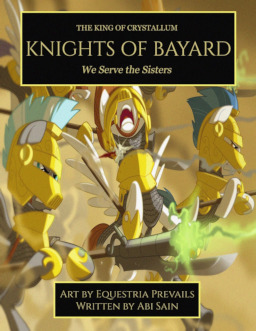
Chapter One (Unedited)
In the late summer in that year they lived in an inn in a small village that looked across the river and the fields and the mountains. Along the river there were fields of hay, gold beneath the sun, and the older wolf-ponies fished for carp along the bed of the river and gathered water in large wooden buckets. The water was clear and the troops would often drink from the river, but were forbidden from washing their clothes there. The villagers believed the river to be sacred, and some feared they would bring Helhest into their village.
Beyond the fields the mountains were brown and bare, and the tri-color banners of the Kingdom were planted along the ridges. There was fighting in the mountains, and at night they could see the torches of nearby camps. In the dark it was calm and cool, but there was always the fear of a night-time raid.
Sometimes in the dark Lulamoon could hear the troops marching and large repeaters going past pulled by iron-plated wagons. There was more traffic at night and many ponies on the road with packs of round-shots and black-powder in their saddle-bags and carts that carried pikes and hoof-blades, and wagons with their loads covered and moving slower than the others. There were heavy cannons too that passed both day and night, drawn by hearty drafts, covered in vines and green leafy branches, and repeaters carried by mud-faced ponies wearing grass-sewn cloaks, and with leafy branches tied to their helms. They headed north towards the mountain and at night he could see the flashes of the cannons and the culverins. In the fall, the rain came, and the hay had been gathered and stored in the barns. The fields were bare, and north, towards the mountain, the soil was black and the trees stripped and scorched. The wagons splashed mud and the troops were muddy and wet; their weapons were wet and under their capes the hemp pouches they carried with the bits of bread, hay, and berries, had become soggy and smelly, so that the troops passing on the road brought with them flies and rats.
At the start of winter more troops came, and the village became crowded. Longhouses were made using wattle and daub, and charcoal was prepared and shared with the villagers. Potatoes were grown in the gardens close to the houses, and cleaned in the river. More ponies drank from the river and ate together in the warm inns. Soon the strangles came, but it was checked and in the end only a few hundred died of it before the end of winter.
